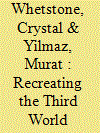| Srl | Item |
| 1 |
ID:
131950


|
|
|
|
|
| Publication |
2014.
|
| Summary/Abstract |
In a novel approach to studying political mobilization among ethnic Tibetans in China, this article addresses two key questions. First, considering the Chinese state's repressive policies towards Tibetan Buddhism, what role does religion play in fomenting Tibetan political resistance? Second, what implications can be drawn from the changing ethnic demography in Tibet about the conflict behaviour of Tibetans? Using various GIS-referenced data, this article specifically examines the 2008 Tibetan protest movements in China. The main results of our analysis indicate that the spread and frequency of protests in ethnic Tibetan areas are significantly associated with the number of officially registered Tibetan Buddhist sites, as well as the historical dominance of particular types of Tibetan religious sects. Furthermore, our analysis shows that the effect of Han Chinese settlement on Tibetan political activism is more controversial than previously though
|
|
|
|
|
|
|
|
|
|
|
|
|
|
|
|
| 2 |
ID:
155857


|
|
|
|
|
| Summary/Abstract |
Migration policy in Russia is implemented by a variety of actors, such as state officials, market actors, and social activists. In the implementation of migration policy, they inevitably interact with one another. Having examined the categories used by the people involved in the implementation of migration policy, I explore the potential of coalition-building in this process. In order to scrutinise these fluid political forms, I make use of the concept of ‘queer coalitions’. This concept draws on literature in queer theory, which I argue is also productive for the analysis of current political actions in the migration domain.
|
|
|
|
|
|
|
|
|
|
|
|
|
|
|
|
| 3 |
ID:
171313


|
|
|
|
|
| Summary/Abstract |
In this paper, we make a theoretical argument that the Third World be returned to its political origins to inspire an updated Third World Project (TWP), revived as a global movement for progressive, anti-imperialist forces, through the Fourth World movement, which highlights internal colonialism. Both the TWP and the United Nations recognise only nation states as full members. We examine how a Third World strategy that brings in the Fourth World, or indigenous, minority and/or stateless groups, can help oppressed groups gain more autonomy and rights through a transnational solidarity rooted in empathy. We trace the intellectual roots and history of the TWP and consider obstacles in bringing together the TWP and the Fourth World movement. A Fourth World strategy corrects the TWP’s implicit approval of an underlying imperialism, and the TWP provides the Fourth World movement a model to accomplish its goal of resisting uncritical modernity.
|
|
|
|
|
|
|
|
|
|
|
|
|
|
|
|